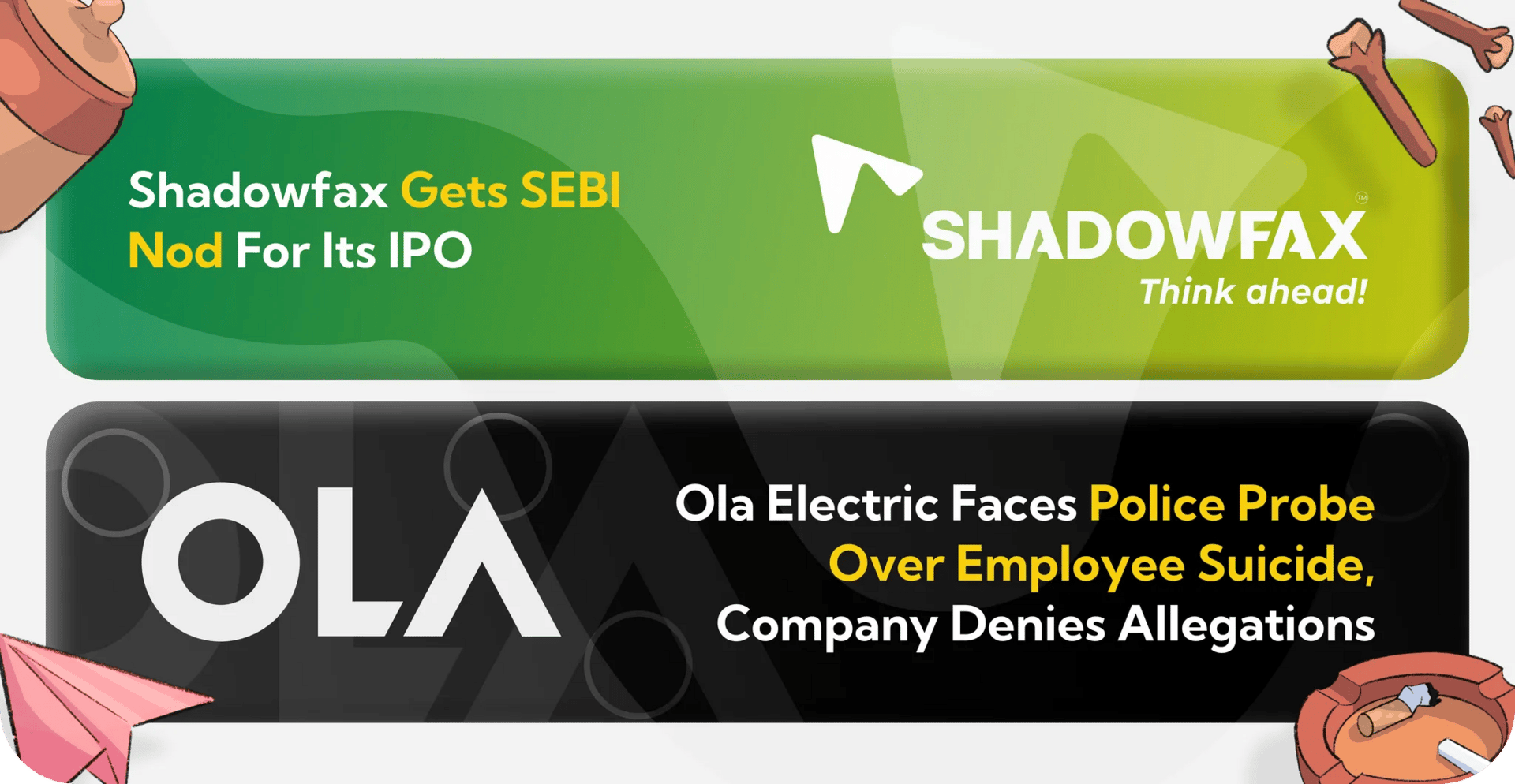- Startup Chai
- Posts
- Shadowfax Gets SEBI Nod, and Ola Electric's Probe & Governance Crisis
Shadowfax Gets SEBI Nod, and Ola Electric's Probe & Governance Crisis
Plus RBI’s High Hopes and fundraising news about Stylox

India’s startup story has always celebrated speed, but the bill for cutting corners is finally coming due. The Ola Electric FIR, naming founder-CEO Bhavish Aggarwal and a senior executive after an engineer’s death, turns “hustle culture” from a PR debate into a criminal and financial risk. A 28-page note alleging harassment and withheld dues, followed by a ₹17.46 lakh transfer to the employee’s account two days after his death, has become a lightning rod for everything investors fear about concentrated founder power and weak internal controls. Even before the courts speak, the market already has: when leadership credibility becomes a question of law, a valuation haircut follows. Call it what it is - the governance discount.
You can see this gap in hard numbers. Ola Electric’s revenue from operations fell ~10% to about ₹4,514 crore in FY25, while net losses widened to roughly ₹2,276 crore; Ather grew revenue ~29% to ~₹2,255 crore and narrowed losses to ~₹812 crore. The public markets noticed: Ather’s stock surged post-listing while Ola’s came under pressure. In market share too, Ola’s slide to ~12.7% by September 2025 - behind TVS, Bajaj, Ather, and Hero Vida - is the operational mirror of a cultural problem. Governance is no longer a soft factor; it now prices cash flows, compresses multiples, and determines who gets patience from investors.
Regulators have started to codify what the market is already punishing. SEBI warned Ola for delayed exchange disclosure after a business update appeared on social media first - exactly the kind of “process miss” that signals weak controls in a company courting public investors. With BRSR pushing social metrics into the core of listed-company reporting, a workplace-safety failure or culture crisis moves from HR inbox to DRHP risk factor. If you can’t file on time, disclose on time, or prove board-level oversight on social risk, you won’t just face headlines - you’ll pay for it at pricing.
The global parallels are familiar and instructive. Uber’s clean-up after the 2017 culture scandal, WeWork’s governance face-plant, and FTX’s board vacuum all tell the same story: when a founder’s will substitutes for controls, the eventual cost is measured in billions and years. India’s difference is timing. We’re compressing that cycle - controversy, regulatory pushback, valuation reset - into months, not years. That’s why competitors with steadier governance - Ather in EVs, or even IPO-bound logistics players with cleaner books - are grabbing the “resilience premium” right now.
This isn’t an anti-founder argument; it’s anti-opacity. The fix is annoyingly practical. Separate the story from the steering: independent directors with real agency, whistle-blower channels that skip management, disclosure that hits exchanges before X, and auditable rules on employee settlements so a large post-event transfer never needs “explaining.” Tie KMP (Key Managerial Personnel) incentives to measurable social KPIs, not just revenue, and publish what you practice - attrition, grievance resolution, culture audits - before a banker demands it. None of these guarantee perfection. They buy trust when you most need it.
If you want the ecosystem takeaway in one line: Indian public investors are done funding vibes. They’ll pay up for clean governance, predictable disclosure, and shrinking losses; they’ll discount charisma and punish process debt. The proof points are on the tape already - Ola’s stock pressure versus Ather’s run, Ola’s share loss versus peers with steadier execution - and in the regulator’s file, where a late LODR disclosure is treated as a signal, not a slip. The founder era isn’t over; the unchecked founder era is.
Let’s go through what else is happening in Indian startup world - Grab your simmering cup of StartupChai.in and unwind with our hand-brewed memes.

“Paayega Jo Tu Lakshya Hai Tera”: Shadowfax Gets SEBI Nod For Its IPO
Shadowfax has zipped past another milestone, securing SEBI’s approval for its IPO. The logistics unicorn plans to raise up to ₹2,000 Cr and is eyeing a post-IPO valuation of around ₹8,500 Cr, a solid 40% jump from its last funding round.
If all goes to plan, Shadowfax will join Delhivery and BlackBuck as India’s next listed logistics trailblazer.
Read more here

“Success On Stairs Of Graveyards”: Ola Electric Faces Police Probe Over Employee Suicide, Company Denies Allegations
Ola Electric has found itself in the eye of a storm after Bengaluru Police filed an FIR against founder Bhavish Aggarwal and a senior executive over an employee’s suicide note alleging workplace harassment and unpaid dues.
The company has denied the charges and moved the Karnataka High Court, which has granted temporary relief.
Read more here

“We’re The Best”: Robust domestic demand and low inflation key growth drivers, Says RBI
The RBI’s latest bulletin paints a confident picture of India’s economy, crediting robust domestic demand and easing inflation as key growth engines.
Even as global uncertainty and trade tensions rise, India’s fundamentals remain strong and steady. In a shaky world, the central bank says, the Indian economy continues to walk with surprising poise.
Read more here


Denim and casual wear brand Stylox Fashion secured INR 3 Crores in funding from the Fashion Entrepreneur Fund (FEF). This investment, which will fuel the brand's D2C expansion, followed Stylox's successful pitch on the reality show Pitch To Get Rich (streaming on Jio Hotstar).
Read more here
How did today's serving of StartupChai fare on your taste buds? |